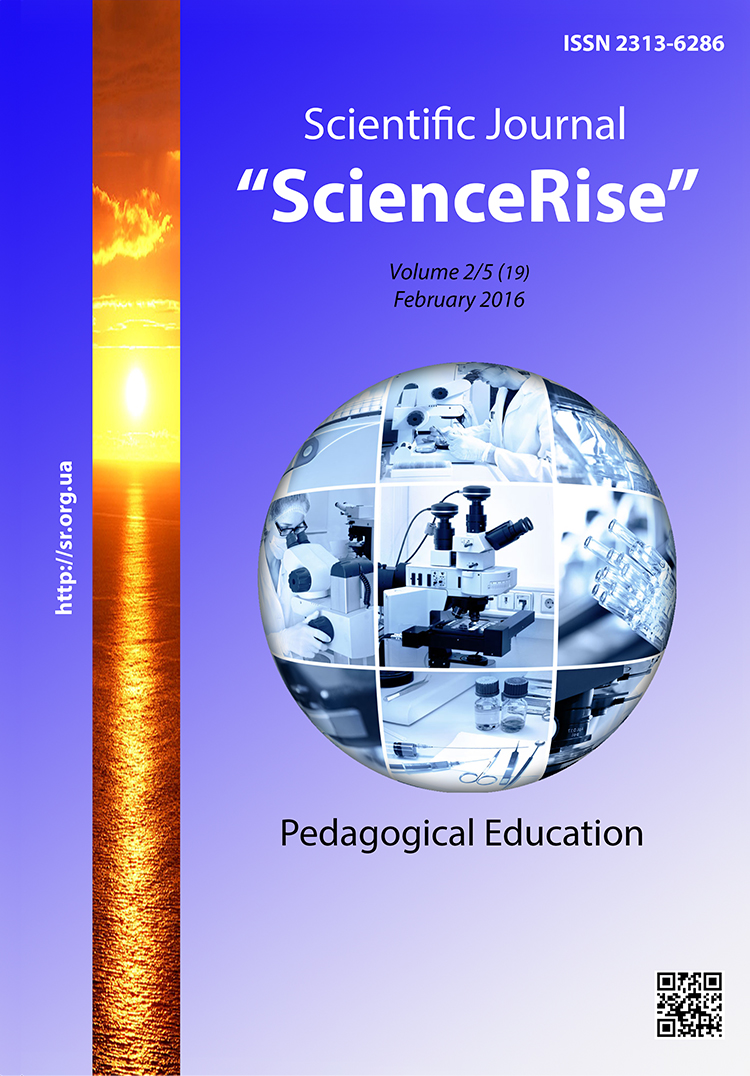The study of effectiveness of introducing the model of teacher creative potential development in the educational innovations Center of the institute of postgraduate pedagogical education
DOI:
https://doi.org/10.15587/2313-8416.2016.60499Keywords:
teacher creative potential, pedagogical experiment, educational innovations Center, methodical workAbstract
In the article was described pedagogical experiment on the examination of effectiveness of the model of teacher creative potential development in educational innovation Center of the institute of pedagogical postgraduate education.
Experimental study continued from September 2011 till October 2015. 500 teachers took part in it: 2 experimental groups (200 persons) and 3 control ones (300 persons) with almost equal qualitative and quantitative contingent.
The special features of methodical work for development of the creative possibilities of experimental group members within the approbation of the model elaborated in CHEI “Kharkiv academy of continuous education” were: continuity, systemic character, creation of educational trajectories of teachers on diagnostic base, long-term planning, orientation on gaining the system of knowledge and skills, thorough enrichment of creative activity experience.
The comparative analysis of the data about levels of creative potential revealed that during experiment the number of teachers who are characterized with sufficient and high levels of creative potential in experimental groups increased by 11%, whereas in the control ones this index was only 4 %. The positive dynamics in experimental groups was observed in all components and criteria of teacher creative potential.
Examination of statistical significance of the received results was carried out using χ criterion. In experimental groups index Тs ≈ 18,36 exceeds Тcr= 7,81 so it is statistically significant. In the control groups Тs ≈ 1,096 is less than Тcr= 7,81 so it is possible to assert that the changes in the levels of creative potential are not essential and could be caused by accidental factors.
Thus the results of experiments prove the correctness of initial hypothesis that an effectiveness of the teacher creative potential development grows owing to introducing the model of teacher creative potential development in the educational innovations Center of the institute of postgraduate pedagogical education
References
Lunina, V. Yu. (2015). Model’uvann’a rozvytku tvorchogo potencialu vchytel’a na osnovi roboty Centru osvitnih innovacij zakladu pisl’adyplomnoji pedagogichnoji osvity [Modelling of the teacher creative potential development based on work of the Educational Innovations Center of the institute of postgraduate pedagogical education]. The Postgraduate Education Digest, 15, 96–107.
Ivanchenko, V. N. (2010). Razvitie tvorcheskogo potenciala pedagoga dopolnitel’nogo obrazovanija v sisteme povyshenija kvalifikacii [The development of creative potential of the additional education trainer in system of postgraduate education]. Rostov-na-Donu, 210.
Korets’, M. S. (2007). Teorija i praktyka tehnichnoji pidgotovky vchyteliv trudovogo navchann’a [Theory and practice of technical preparation of labor teachers]. Kyiv, 38.
Kovalyova, S. V. (2007). Rozvytok tvorchoji aktyvnosti vchyteliv muzyky v systemi pidvyshchenn’a kvalifikaciji [The development of creative activity of music teachers in system of postgraduate education]. Kyiv, 301.
Martyshina, N. V. (2009). Stanovlenie i razvitie tvorcheskogo potenciala pedagoga v sisteme nepreryvnogo pedagogicheskogo obrazovanija [The formation and development of pedagogue creative potential in system of continuous pedagogical education]. Ryazan, 168.
Ustynova, N. V. (2006). Rozvitok tvorchogo potencialu vchytelya v systemi pisl’adyplomnoji pedagogichnoji osvity [The development of teacher creative potential in system of postgraduate pedagogical education]. Kyiv, 21.
Pirozhkova, O. B. (2008). Model’ razvitija tvorcheskogo potenciala uchitelej innovacionnyh shkol [The model for the development of creative potential of teachers of innovative schools]. Omsk Scientific Digest, 66 (2), 123–126.
Ravl’uk, T. A. (2012). Rozvytok tvorchogo potencialu majbutnih social’nyh pedagogiv u procesi social’no-pedagogichnoji praktyky [The development of creative potential of future social pedagogues during their social-pedagogical training]. Ternopol, 23.
Churbanova, L. K. (2014). Razvitie tvorcheskogo potenciala pedagoga dopolnitel’nogo obrazovanija [The development of creative potential of the additional education trainer]. Psychology and pedagogy of XXI century: theory, practice, perspectives. Cheboksary: Center of Science Partnership “Interactive Plus”, 14–16.
Honcharenko, Ya. V. (2012). Matematychni metody analizu rezul’tativ pedagogichnogo experimentu [Mathematical methods of analyzing the results of the pedagogical experiment]. Кyiv: NPU by M. P. Dragomanov, 168–175.
Grabar’, M. I., Krasnyanskaja, K. A. (1997). Primenenie matematicheskoy statistiki v pedagogicheskih issledovanijah [Using mathematical statistic in pedagogical research]. Moscow: Pedagogy, 136.
Rudenko, V. M. (2012). Matematychna statystyka [Mathematical statistic]. Kyiv: Educational Literature Center, 304.
Sydorenko, Ye. V. (2000). Matematicheskie metody obrabotki v psihologii [Mathematical methods of processing in psychology]. Sankt-Peterburg: Rech ltd, 350.
Novak, O. M. (2014). Osoblyvosti vprovadzhenn’a innovacijnyh tehnologij y praktyku roboty zagal’noosvitnih navchal’nyh zakladiv. Issue 51 [The peculiarities of implementing the innovative technologies into functioning of secondary schools. Issue 51]. Uman’ State Pedagogical Tychyna University. Uman: SEA Zhovtyj O. O., 80–87.
Pidlasyj, I. P., Pidlasij, A. I. (1998). Pedagogichni innovaciji [Pedagogical innovations]. Own school, 12, 3–17.
Slobodchikov, V. I. (2003). Problemy stanovlenija i razvitija innovacionnogo obrazovanija [The problems in formation and development of innovative education]. Innovations in education, 2, 4–18.
Yantsur, M. S. (1995). Profesiyna psyhodiagnostyka: praktykum [Professional psychological diagnostic: practical training]. Kyiv: MPU DCZ, MOU RDPI, 158.
Downloads
Published
Issue
Section
License
Copyright (c) 2016 Вікторія Юріївна Луніна

This work is licensed under a Creative Commons Attribution 4.0 International License.
Our journal abides by the Creative Commons CC BY copyright rights and permissions for open access journals.
Authors, who are published in this journal, agree to the following conditions:
1. The authors reserve the right to authorship of the work and pass the first publication right of this work to the journal under the terms of a Creative Commons CC BY, which allows others to freely distribute the published research with the obligatory reference to the authors of the original work and the first publication of the work in this journal.
2. The authors have the right to conclude separate supplement agreements that relate to non-exclusive work distribution in the form in which it has been published by the journal (for example, to upload the work to the online storage of the journal or publish it as part of a monograph), provided that the reference to the first publication of the work in this journal is included.

